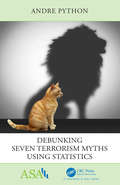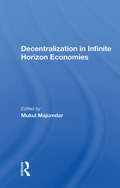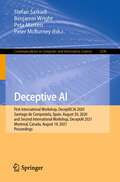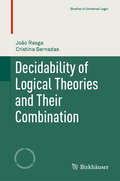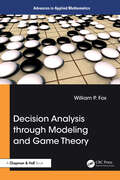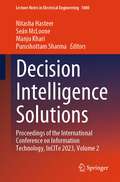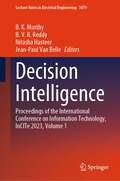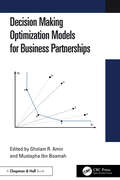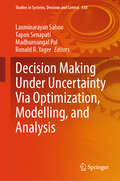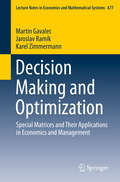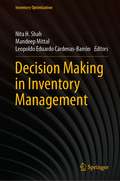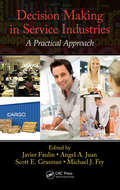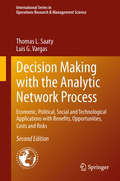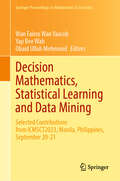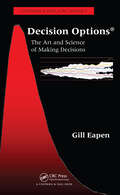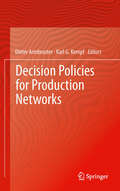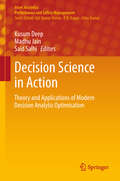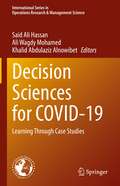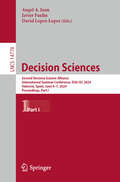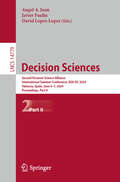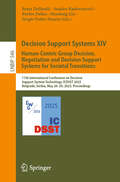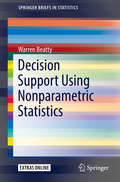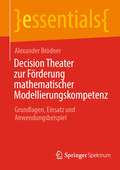- Table View
- List View
Debunking Seven Terrorism Myths Using Statistics (ASA-CRC Series on Statistical Reasoning in Science and Society)
by Andre PythonWhat is terrorism? What can we learn and what cannot we learn from terrorism data? What are the perspectives and limitations of the analysis of terrorism data? Over the last decade, scholars have generated unprecedented insight from the statistical analysis of ever-growing databases on terrorism. Yet their findings have not reached the public. This book translates the current state of knowledge on global patterns of terrorism free of unnecessary jargon. Readers will be gradually introduced to statistical reasoning and tools applied to critically analyze terrorism data within a rigorous framework. Debunking Seven Terrorism Myths Using Statistics communicates evidence-based research work on terrorism to a general audience. It describes key statistics that provide an overview of the extent and magnitude of terrorist events perpetrated by actors independent of state governments across the world. The books brings a coherent and rigorous methodological framework to address issues stemming from the statistical analysis of terrorism data and its interpretations. Features Uses statistical reasoning to identify and address seven major misconceptions about terrorism. Discusses the implications of major issues about terrorism data on the interpretation of its statistical analysis. Gradually introduces the complexity of statistical methods to familiarize the non-statistician reader with important statistical concepts to analyze data. Use illustrated examples to help the reader develop a critical approach applied to the quantitative analysis of terrorism data. Includes chapters focusing on major aspects of terrorism: definitional issues, lethality, geography, temporal and spatial patterns, and the predictive ability of models.
Decentralization In Infinite Horizon Economies
by Mukul MajumdarThis book summarizes some issues involved in developing a theory of decentralized resource allocation mechanism in infinite horizon economies. It constitutes a definitive account of cutting-edge research on a topic of continuing importance in price theory. .
Deceptive AI: First International Workshop, DeceptECAI 2020, Santiago de Compostela, Spain, August 30, 2020 and Second International Workshop, DeceptAI 2021, Montreal, Canada, August 19, 2021, Proceedings (Communications in Computer and Information Science #1296)
by Benjamin Wright Stefan Sarkadi Peta Masters Peter McBurneyThis book constitutes selected papers presented at the First International Workshop on Deceptive AI, DeceptECAI 2020, held in conjunction with the 24th European Conference on Artificial Intelligence, ECAI 2020, in Santiago de Compostela, Spain, in August 2020, and Second International Workshop on Deceptive AI, DeceptAI 2021, held in conjunction with the 30th International Joint Conference on Artificial Intelligence, IJCAI 2021, in Montreal, Canada, in August 2021. Due to the COVID-19 pandemic both conferences were held in a virtual mode. The 12 papers presented were thoroughly reviewed and selected from the 16 submissions. They present recent developments in the growing area of research in the interface between deception and AI.
Decidability of Logical Theories and Their Combination (Studies in Universal Logic)
by João Rasga Cristina SernadasThis textbook provides a self-contained introduction to decidability of first-order theories and their combination. The technical material is presented in a systematic and universal way and illustrated with plenty of examples and a range of proposed exercises.After an overview of basic first-order logic concepts, the authors discuss some model-theoretic notions like embeddings, diagrams, and elementary substructures. The text then goes on to explore an applicable way to deduce logical consequences from a given theory and presents sufficient conditions for a theory to be decidable. The chapters that follow focus on quantifier elimination, decidability of the combination of first-order theories and the basics of computability theory. The inclusion of a chapter on Gentzen calculus, cut elimination, and Craig interpolation, as well as a chapter on combination of theories and preservation of decidability, help to set this volume apart from similar books in the field.Decidability of Logical Theories and their Combination is ideal for graduate students of Mathematics and is equally suitable for Computer Science, Philosophy and Physics students who are interested in gaining a deeper understanding of the subject. The book is also directed to researchers that intend to get acquainted with first-order theories and their combination.
Decision Analysis through Modeling and Game Theory (Advances in Applied Mathematics)
by William P. FoxThis unique book presents decision analysis in the context of mathematical modeling and game theory. The author emphasizes and focuses on the model formulation and modeling-building skills required for decision analysis, as well as the technology to support the analysis.The primary objective of Decision Analysis through Modeling and Game Theory is illustrative in nature. It sets the tone through the introduction to mathematical modeling. The text provides a process for formally thinking about the problem and illustrates many scenarios and illustrative examples.These techniques and this approach center on the fact (a) decision makers at all levels must be exposed to the tools and techniques available to help them in the decision process, (b) decision makers as well as analysts need to have and use technology to assist in the entire analysis process, (c) the interpretation and explanation of the results are crucial to understanding the strengths and limitations of modeling, and (d) the interpretation and use of sensitivity analysis is essential.The book begins with a look at decision-making methods, including probability and statistics methods under risk of uncertainty. It moves to linear programming and multi-attribute decision-making methods with a discussion of weighting methods. Game theory is introduced through conflict games and zero-sum or constant-sum games. Nash equilibriums are next, followed by utility theory. Evolutionary stable strategies lead to Nash arbitration and cooperation methods and N-person methods presented for both total and partial conflict games.Several real-life examples and case studies using game theory are used throughout. This book would be best used for a senior-level course in mathematics, operations research, or graduate-level courses or decision modeling courses offered in business schools. The book will be of interest to departments offering mathematical modeling courses with any emphasis on modeling for decision making.
Decision Intelligence Solutions: Proceedings of the International Conference on Information Technology, InCITe 2023, Volume 2 (Lecture Notes in Electrical Engineering #1080)
by Manju Khari Seán McLoone Nitasha Hasteer Purushottam SharmaThis book comprises the select peer-reviewed proceedings of the 3rd International Conference on Information Technology (InCITe-2023). It aims to provide a comprehensive and broad-spectrum picture of state-of-the-art research and development in decision intelligence, deep learning, machine learning, artificial intelligence, data science, and enabling technologies for IoT, blockchain, and other futuristic computational technologies. It covers various topics that span cutting-edge, collaborative technologies and areas of computation. The content would serve as a rich knowledge repository on information & communication technologies, neural networks, fuzzy systems, natural language processing, data mining & warehousing, big data analytics, cloud computing, security, social networks and intelligence, decision-making and modeling, information systems, and IT architectures. This book provides a valuable resource for those in academia and industry.
Decision Intelligence: Proceedings of the International Conference on Information Technology, InCITe 2023, Volume 1 (Lecture Notes in Electrical Engineering #1079)
by B. K. Murthy Nitasha Hasteer Jean-Paul Van Belle B. V. R. ReddyThis book comprises the select peer-reviewed proceedings of the 3rd International Conference on Information Technology (InCITe-2023). It aims to provide a comprehensive and broad-spectrum picture of state-of-the-art research and development in decision intelligence, deep learning, machine learning, artificial intelligence, data science, and enabling technologies for IoT, blockchain, and other futuristic computational technologies. It covers various topics that span cutting-edge, collaborative technologies and areas of computation. The content would serve as a rich knowledge repository on information & communication technologies, neural networks, fuzzy systems, natural language processing, data mining & warehousing, big data analytics, cloud computing, security, social networks, and intelligence, decision-making, and modeling, information systems, and IT architectures. This book provides a valuable resource for those in academia and industry.
Decision Making Optimization Models for Business Partnerships
by Gholam R. Amin Mustapha Ibn BoamahEfficiency and productivity improvement are imperative for businesses to remain competitive in an increasingly dynamic marketplace. While business organizations have the potential to thrive independently, collaborating with others fosters a collective strength that can lead to greater innovation, expanded reach, and shared success.Decision making optimization models for business partnerships are essential, as businesses seldom have all the resources they need, and thus, they require alliances and partnerships with others to enable them to meet their goals. Decision Making Optimization Models for Business Partnerships extends non-parametric data envelopment analysis (DEA) and parametric econometrics approaches to better understand how economic efficiency and market competitiveness are achieved for different types of partnerships and strategic alliances.Features Global contributions for a wide range of professionals and academics Invaluable resources for businesses, analysts, and academics interested in DEA, optimization, and operations research more widely Introduces readers to novel approaches, models, and decision making techniques on performance evaluation and business partnerships via the medium of parametric and nonparametric optimization.
Decision Making Theories and Methods Based on Interval-Valued Intuitionistic Fuzzy Sets
by Shuping Wan Jiuying DongThis is the first book to provide a comprehensive and systematic introduction to the ranking methods for interval-valued intuitionistic fuzzy sets, multi-criteria decision-making methods with interval-valued intuitionistic fuzzy sets, and group decision-making methods with interval-valued intuitionistic fuzzy preference relations. Including numerous application examples and illustrations with tables and figures and presenting the authors’ latest research developments, it is a valuable resource for researchers and professionals in the fields of fuzzy mathematics, operations research, information science, management science and decision analysis.
Decision Making Under Uncertainty Via Optimization, Modelling, and Analysis (Studies in Systems, Decision and Control #558)
by Ronald R. Yager Laxminarayan Sahoo Madhumangal Pal Tapan SenapatiThis book focuses on cutting-edge developments in optimal decision-making incorporating modeling and optimization for determining renewable energy sources, supply chain management, and environmental planning under uncertainty. It addresses mathematical models of cost-effective management policies. This book presents the best decision-making practices for solving real-world challenges. This book provides access to an invaluable collection of various decision-making issues that scholars and industry practitioners use as a reference. The readers are able to understand how decision-making problems are formulated under uncertainty and how to use right optimization strategies to fix problems.
Decision Making and Decision Support in the Information Era: Dedicated to Academician Florin Filip (Studies in Systems, Decision and Control #534)
by Janusz Kacprzyk Valentina Emilia Balas Gintautas Dzemyda Smaranda BelciugThis book is a comprehensive and full-fledged presentation of how modern algorithmic tools and techniques with software implementations can provide an effective and efficient solution of a multitude of problems faced in real life. These problems range from all kinds of data analyses, medical data analyses, image analyses and recognitions, support of medical diagnoses, etc. to new concepts of smart towns and other environments. Emphasis will be on the role of intelligent systems and artificial intelligence and a synergistic collaboration between human beings and computer systems. Modern decision support systems are a main focus point.
Decision Making and Optimization
by Martin Gavalec Jaroslav Ramík Karel ZimmermannThe book is a benefit for graduate and postgraduate students in the areas of operations research, decision theory, optimization theory, linear algebra, interval analysis and fuzzy sets. The book will also be useful for the researchers in the respective areas. The first part of the book deals with decision making problems and procedures that have been established to combine opinions about alternatives related to different points of view. Procedures based on pairwise comparisons are thoroughly investigated. In the second part we investigate optimization problems where objective functions and constraints are characterized by extremal operators such as maximum, minimum or various triangular norms (t-norms). Matrices in max-min algebra are useful in applications such as automata theory, design of switching circuits, logic of binary relations, medical diagnosis, Markov chains, social choice, models of organizations, information systems, political systems and clustering. The input data in real problems are usually not exact and can be characterized by interval values.
Decision Making in Inventory Management (Inventory Optimization)
by Nita H. Shah Mandeep Mittal Leopoldo Eduardo Cárdenas-BarrónThis book provides several inventory models for making the right decision in inventory management under different environments. Basically, the optimal ordering policies are determined for situations with and without shortages in production-inventory systems. The chapters in the book include various features of inventory modeling i.e., inflation, deterioration, supply chain, learning, credit financing, carbon emission policy, stock-dependent demand, among others. The book is a useful resource for academicians, researchers, students, practitioners, and managers who can be benefited with the policies provided in the chapters of the book.
Decision Making in Service Industries: A Practical Approach
by Javier Faulin Angel A. Juan Michael J. Fry Scott E. GrasmanIn real-life scenarios, service management involves complex decision-making processes usually affected by random or stochastic variables. Under such uncertain conditions, the development and use of robust and flexible strategies, algorithms, and methods can provide the quantitative information necessary to make better business decisions. Decision M
Decision Making with the Analytic Network Process
by Thomas L. Saaty Luis G. VargasThe Analytic Network Process (ANP), developed by Thomas Saaty in his work on multicriteria decision making, applies network structures with dependence and feedback to complex decision making. This new edition of Decision Making with the Analytic Network Process is a selection of the latest applications of ANP to economic, social and political decisions, and also to technological design. The ANP is a methodological tool that is helpful to organize knowledge and thinking, elicit judgments registered in both in memory and in feelings, quantify the judgments and derive priorities from them, and finally synthesize these diverse priorities into a single mathematically and logically justifiable overall outcome. In the process of deriving this outcome, the ANP also allows for the representation and synthesis of diverse opinions in the midst of discussion and debate. The book focuses on the application of the ANP in three different areas: economics, the social sciences and the linking of measurement with human values. Economists can use the ANP for an alternate approach for dealing with economic problems than the usual mathematical models on which economics bases its quantitative thinking. For psychologists, sociologists and political scientists, the ANP offers the methodology they have sought for some time to quantify and derive measurements for intangibles. Finally the book applies the ANP to provide people in the physical and engineering sciences with a quantitative method to link hard measurement to human values. In such a process, one is able to interpret the true meaning of measurements made on a uniform scale using a unit.
Decision Mathematics, Statistical Learning and Data Mining: Selected Contributions from ICMSCT2023, Manila, Philippines, September 20-21 (Springer Proceedings in Mathematics & Statistics #461)
by Yap Bee Wah Wan Fairos Wan Yaacob Obaid Ullah MehmoodThis book is a collection of selected research papers presented at the Mathematics, Statistics and Computing Technology (ICMSCT2023), held at the UST Angelicum College, Philippines, from 20th to 21st September 2023. This biennial event is a result from collaborations of university partners in Malaysia, Thailand, Indonesia and Philippines. Increasing investment in digital technologies is a challenge faced by most countries after the crisis caused by COVID-19 and the demand of technological revolution 4.0. Indirectly, regardless of their level of development, they take into account the importance of redesigning strategies for resilient and sustainable regional economic development, increasing regional resilience and minimizing recovery costs as a basis for development. In such situation, this book gather discussion, viewpoints and findings on the recent works of mathematical and computing technology applications in order to propose solutions to overcome adversity of digital resilience. This book covers a wide range of topics on applied mathematics, which includes decision mathematics and also applied statistics covering statistical learning with applications. In addition, the book also highlight the latest application of statistical mining and data visualization, particularly on data mining, machine learning and data visualization. Editors believe this book will interest and influence researchers on the recent techniques, methodologies and applications to ensure digital resilience and support future research.
Decision Options: The Art and Science of Making Decisions (Chapman & Hall/CRC Finance Series)
by Gill EapenThrough theory and case studies, this book details how uncertainty and flexibility can be evaluated to assist in making better investment decisions in companies. It delivers an excellent balance of theory and practice in the area of investment decision making, demonstrates how financial and real options are related, and describes the theoretical underpinnings of both. The author presents case studies from diverse industries, including life sciences, pharmaceuticals, commodities, energy, technology, manufacturing, and financial services. He also looks at how organizations can become successful using a holistic framework that integrates uncertainty and flexibility.
Decision Policies for Production Networks
by Dieter Armbruster Karl G. KempfThe financial results of any manufacturing company can be dramatically impacted by the repetitive decisions required to control a complex production network be it a network of machines in a factory; a network of factories in a company; or a network of companies in a supply chain. Decision Policies for Production Networks presents recent convergent research on developing policies for operating production networks including details of practical control and decision techniques which can be applied to improve the effectiveness and economic efficiency of production networks worldwide. Researchers and practitioners come together to explore a wide variety of approaches to a range of topics including: WIP and equipment management policies, Material release policies, Machine, factory, and supply chain network policies for delivery in the face of supply and demand variability, and Conflicts between complex production network models and their controlling policies. Case studies and relevant mathematical techniques are included to support and explain techniques such as heuristics, global and hierarchical optimization, control theory and filtering approaches related to complex systems or traffic flows. Decision Policies for Production Networks acts as handbook for researchers and practitioners alike, providing findings and information which can be applied to develop methods and advance further research across production networks.
Decision Science in Action: Theory And Applications Of Modern Decision Analytic Optimisation (Asset Analytics)
by Kusum Deep Madhu Jain Said SalhiThis book provides essential insights into a range of newly developed numerical optimization techniques with a view to solving real-world problems. Many of these problems can be modeled as nonlinear optimization problems, but due to their complex nature, it is not always possible to solve them using conventional optimization theory. Accordingly, the book discusses the design and applications of non-conventional numerical optimization techniques, including the design of benchmark functions and the implementation of these techniques to solve real-world optimization problems. The book’s twenty chapters examine various interesting research topics in this area, including: Pi fraction-based optimization of the Pantoja–Bretones–Martin (PBM) antenna benchmarks; benchmark function generators for single-objective robust optimization algorithms; convergence of gravitational search algorithms on linear and quadratic functions; and an algorithm for the multi-variant evolutionary synthesis of nonlinear models with real-valued chromosomes. Delivering on its promise to explore real-world scenarios, the book also addresses the seismic analysis of a multi-story building with optimized damper properties; the application of constrained spider monkey optimization to solve portfolio optimization problems; the effect of upper body motion on a bipedal robot’s stability; an ant colony algorithm for routing alternate-fuel vehicles in multi-depot vehicle routing problems; enhanced fractal dimension-based feature extraction for thermal face recognition; and an artificial bee colony-based hyper-heuristic for the single machine order acceptance and scheduling problem. The book will benefit not only researchers, but also organizations active in such varied fields as Aerospace, Automotive, Biotechnology, Consumer Packaged Goods, Electronics, Finance, Business & Banking, Oil, Gas & Geosciences, and Pharma, to name a few.
Decision Sciences for COVID-19: Learning Through Case Studies (International Series in Operations Research & Management Science #320)
by Said Ali Hassan Ali Wagdy Mohamed Khalid Abdulaziz AlnowibetThis book presents best practices involving applications of decision sciences, business tactics and behavioral sciences for COVID-19. Addressing concrete problems in these vital fields, it focuses on theoretical and methodological investigations of managerial decisions that drive production and service enterprises’ productivity and success. Moreover, it presents optimization techniques and tools that can also be adopted for other applications in various research areas after a thorough analysis of the specific problem. The book is intended for researchers and practitioners seeking optimum solutions to real-life problems in various application areas concerning COVID-19, helping them make scientifically founded decisions.
Decision Sciences: Second Decision Science Alliance International Summer Conference, DSA ISC 2024, Valencia, Spain, June 6–7, 2024, Proceedings, Part I (Lecture Notes in Computer Science #14778)
by Javier Faulin Angel A. Juan David Lopez-LopezThis book constitutes the proceedings of the Second Decision Science Alliance International Summer Conference, DSA ISC 2024, held in Valencia, Spain, in June 2024. The 33 full papers and 38 short papers included in this book were carefully reviewed and selected from 101 submissions. At the core of DSA ISC’24 are in-depth discussions and analyses across a spectrum of technological domains. Notably, experts shared their knowledge on areas such as Artificial Intelligence & Machine Learning, Mathematical Optimization, Operational Research & Management Science, Statistics, Simulation, and Decision Processes Analysis. Each of these areas represents a key aspect of decision science, contributing to the interdisciplinary nature of the conference.
Decision Sciences: Second Decision Science Alliance International Summer Conference, DSA ISC 2024, Valencia, Spain, June 6–7, 2024, Proceedings, Part II (Lecture Notes in Computer Science #14779)
by Javier Faulin Angel A. Juan David Lopez-LopezThis book constitutes the proceedings of the Second Decision Science Alliance International Summer Conference, DSA ISC 2024, held in Valencia, Spain, in June 2024. The 33 full papers and 38 short papers included in this book were carefully reviewed and selected from 101 submissions. At the core of DSA ISC’24 are in-depth discussions and analyses across a spectrum of technological domains. Notably, experts shared their knowledge on areas such as Artificial Intelligence & Machine Learning, Mathematical Optimization, Operational Research & Management Science, Statistics, Simulation, and Decision Processes Analysis. Each of these areas represents a key aspect of decision science, contributing to the interdisciplinary nature of the conference.
Decision Support Systems XIV. Human-Centric Group Decision, Negotiation and Decision Support Systems for Societal Transitions: 11th International Conference on Decision Support System Technology, ICDSST 2025, Belgrade, Serbia, May 26–29, 2025, Proceedings (Lecture Notes in Business Information Processing #546)
by Boris Delibašić Shaofeng Liu Pavlos Delias Sérgio Pedro Duarte Sandro RadovanovićThis book constitutes the proceedings of the 11th International Conference on Decision Support Systems Technologies, ICDSST 2025, held in Belgrade, Serbia, in May 2025. The EWG-DSS series of International Conference on Decision Support System Technology (ICDSST) is planned to consolidate the tradition of annual events organized by the EWG-DSS in offering a platform for European and international DSS communities, comprising the academic and industrial sectors, to present state-of-the-art DSS research and developments, to discuss current challenges that surround decision-making processes, to exchange ideas about realistic and innovative solutions, and to co-develop potential business opportunities. This year the main focus was: Decision Support System Technology in the AI Era. The 10 full papers included in these proceedings were carefully reviewed and selected from 39 submissions. They have been organized in topical sections as follows: Decision support systems; artificial intelligence and machine learning; and decision support system challenges.
Decision Support Using Nonparametric Statistics
by Warren BeattyThis concise volume covers nonparametric statistics topics that most are most likely to be seen and used from a practical decision support perspective. While many degree programs require a course in parametric statistics, these methods are often inadequate for real-world decision making in business environments. Much of the data collected today by business executives (for example, customer satisfaction opinions) requires nonparametric statistics for valid analysis, and this book provides the reader with a set of tools that can be used to validly analyze all data, regardless of type. Through numerous examples and exercises, this book explains why nonparametric statistics will lead to better decisions and how they are used to reach a decision, with a wide array of business applications. Online resources include exercise data, spreadsheets, and solutions.
Decision Theater zur Förderung mathematischer Modellierungskompetenz: Grundlagen, Einsatz und Anwendungsbeispiel (essentials)
by Alexander BrödnerDieses Buch bietet eine grundlegende Einführung in den Einsatz der Methode des Decision Theater zur Vermittlung von mathematischer Modellierungskompetenz im Schulkontext. In den letzten Jahren hat sich unter anderem anhand der Covid-19 Pandemie mehr denn je gezeigt, wie Mathematik im Allgemeinen und das mathematische Modellieren im Speziellen zum Verständnis globaler Herausforderungen und Möglichkeiten zu ihrer Bewältigung beiträgt. Deshalb sollte die mathematische Modellierungskompetenz eine zentrale Rolle im Schulunterricht spielen. Doch der Prozess von Vermittlung und Erwerb einer solchen Kompetenz ist komplex und mit vielfältigen Schwierigkeiten verbunden. Angesichts dieser Ausgangslage stellt das Buch die Methode des Decision Theater als innovative Lernumgebung neuer Art vor, die die Vermittlung von mathematischer Modellierungskompetenz unterstützen kann. Dabei trägt die Methode des Decision Theatre auf drei Ebenen dazu beiträgt, Modellierungskompetenz und ein damit verbundenes ganzheitliches Bild der Mathematik zu fördern: Das Decision Theatre dient als IT-Dienstleister, als Wissenschaftskommunikator und als interaktiv-diskursive Lernumgebung. Neben Geschichte und Definition des Decision Theater, stellt das Buch dessen Einsatz konkret am Beispiel des Projekts „Schule @ Decision Theatre Lab“ des Berliner Exzellenzclusters MATH+ Berlin Mathematics Research Center vor. Als Zusammenfassung der wichtigsten Aspekte des Einsatzes der Methode des Decision Theater im Schulkontext richtet sich das Buch an Didaktiker*innen und Lehrkräfte aller Schulformen.
